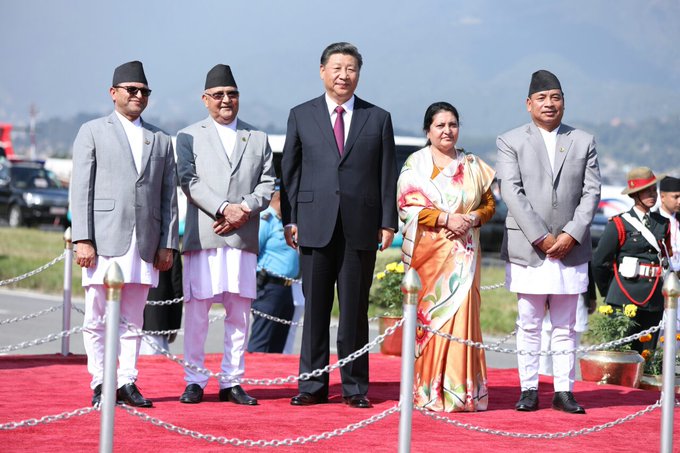President Xi Jinping has wrapped up a landmark visit to Nepal, the first by a Chinese president in 23 years, with 20 deals signed and nearly $500m in financial aid pledged amid Beijing's growing influence in the impoverished Himalayan nation.
After talks in the capital, Kathmandu on Sunday, Xi and Nepalese Prime Minister KP Sharma Oli witnessed the signing of 18 agreements and two letters of exchange in areas of connectivity, security, border management, trade, tourism and education.
Along with a Chinese delegation, Xi arrived in Kathmandu from Chennai on Saturday for the start of his two-day state visit after meeting Indian Prime Minister Narendra Modi. He departed for Beijing on Sunday.
Nepal's Foreign Minister Pradeep Gyawali described Xi's visit as one of "historic significance" for Nepal.
"Our priority is to create opportunities for Nepal, joining it to China's development. We are focusing on connectivity between the two countries," he said.
In a signed article published in Nepali newspapers on Friday, Xi said he would use the two-day visit to "renew friendship and explore cooperation with my Nepali friends".
"It is important that we adopt a strategic and long-term perspective and draw up a blueprint for our bilateral relationship to take it to a new height in this new era," Xi added.
President Rt. Hon. Mrs. Bidya Devi Bhandari flanked by Vice-President Rt. Hon. Mr. Nanda Bahadur Pun, Prime Minister Rt . Hon. K P Sharma Oli and Chairman of the National Assembly bid farewell to the President of the People’s Republic of China H.E. Mr. Xi Jinping.@PradeepgyawaliK
During delegation-level talks with President Bidhya Devi Bhandari on Saturday, Xi announced 56 billion rupees ($492m) in economic assistance for Nepal over the next two years, an official told the Kathmandu Post on condition of anonymity.
Separate deals for a trans-Himalayan railway link to Tibet and a tunnel were reached on Sunday.
The 70-km (42-mile) rail link will connect Gyiron in Tibet with Nepal's capital city of Kathmandu, making it one of the most ambitious infrastructure projects in the country.
Key geopolitical actor
Landlocked Nepal, geographically sandwiched between India and China, is seeking closer ties and much-needed energy and infrastructure investment from Beijing.
Asian giants India and China have both sought to woo Nepal and have poured in aid and infrastructure investment.
In 2017, Nepal signed up to China's Belt and Road initiative, a vast global infrastructure programme, which includes the building or upgrading of highways and airports in the country.
Although India has traditionally been Nepal's main ally, China has intensified its presence, pumping millions of dollars into projects ranging from roads to hydropower plants.
Lok Raj Baral, a former Nepalese ambassador to India, said Nepal has to be "very cautious" and maintain a "good balance" between the two neighbours.
"Nepal is very important from a geopolitical point of view, it's location itself is very important, which is why we should be very careful," he told Al Jazeera in a phone interview from Kathmandu.
"We cannot play one neighbour against the other."
'Political costs'
India has extensive influence on Nepal's economy and politics, while China and Nepal share a border covered with high mountain peaks.
A prolonged blockade of its border crossings with India in 2015 and 2016 left Nepal short of fuel and medicine for months.
According to Manoj Kewalramani, a fellow for China Studies at the Bangalore-based Takshashila Institution, smaller states like Nepal see China as an opportunity to "hedge what they might see as India's excessive influence" in the region.
"From an Indian point of view, I would say these are signs of how things are changing for India in the neighbourhood," he said of Xi's visit.
"We need to accept the fact that China is much more active and expressively intent through actions of wanting Nepal to [move from being] landlocked to land-linked, and that link has to come through China," he told Al Jazeera in a phone interview.
He noted, however, that there are "certain political costs" attached to Beijing's increased investment.
"This is an opportunity to develop and to attract investment for the betterment of the economy, but there are risks with that and it's about the dexterity of your foreign policy to be able to manage some of these risks and that's the challenge."


No comments:
Post a Comment